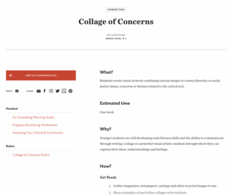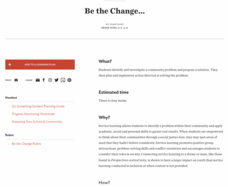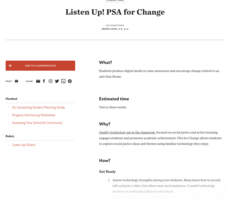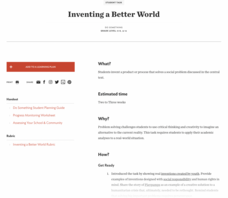Teaching Tolerance
Using Photographs to Teach Social Justice | Exploring Identity
Even without captions, photographs can tell amazing, involved, and complex stories. Viewers analyze two photos, consider what the pictures reveal about the subjects' identity, and determine the social justice issues represented in the...
Teaching Tolerance
Journalism for Justice
Roll the presses! Or at least have your class members participate in the time-honored tradition of the student press by creating their own newspapers or journalist pieces on a social problem. After conducting research and collaborating...
Teaching Tolerance
Film Festival
Everybody's a critic—even your pupils! Using the included resources as a guide, screen films related to social justice and ask film enthusiasts to critique them. Publish the reviews for your school community or develop a film festival...
Teaching Tolerance
Community Bulletin Board
A project-based lesson has pupils create a bulletin board to share artwork, nonfiction articles, and messages based on social justice themes. The finished board is displayed in the community to create a place for discussion.
Teaching Tolerance
Community Newsletter
What does it take to develop and publish a newsletter? Young academics create a newsletter with original artwork for their school or community. They explore social justice themes and spread messages of tolerance and inclusion. Scholars...
Teaching Tolerance
Community Arts Showcase
An art showcase encourages class members to explore the themes of social justice and tolerance. They create an original artwork, engage in group discussions, and journal writing. The art gallery also provides a chance for families and...
Teaching Tolerance
Collage of Concerns
A picture can speak louder than words. An interesting lesson introduces the themes of social justice and diversity to young learners by having them create artwork. Scholars create collages from a variety of sources to showcase what...
Teaching Tolerance
Buddy Share
Here's a project that gives academics the chance to share their opinions on social justice with storytelling, creative writing, or art. Scholars choose what they want to create and are assigned buddies to support their efforts. To...
Teaching Tolerance
Be the Change...
An engaging lesson empowers individuals to make a difference in the community. Pupils work together to identify problems within the community and draft possible solutions. Scholars then take it to the next level by volunteering their...
Teaching Tolerance
Community Mural / Poster Campaign
Every piece matters. A creative lesson provides an opportunity for scholars to create murals or posters that represent their views on social justice. Academics work on smaller posters or pieces of a mural that will ultimately be...
Teaching Tolerance
Artistic Expression Showcase
No one is too young to create a masterpiece. Elementary artists delve into the topic of social justice with original artwork. Scholars keep journals to reflect on their experiences before putting paintbrush to paper. Final artwork is...
Teaching Tolerance
Act Up! Drama for Justice
A lesson turns young historians into playwrights to understand and speak out against social injustice. Pupils work individually or in groups to write and perform monologues that deliver personal messages on social justice. Writers then...
Teaching Tolerance
Listen Up! PSA for Change
Challenge scholars to speak up about a topic by creating a public service announcement or social media blitz about an issue they feel passionate about. Have them research their issues, then decide the best way to take their messages to...
Teaching Tolerance
Inventing a Better World
From play pumps that provide clean water to shoes made from trash, innovators change the world one invention at a time. After researching various inventions, young entrepreneurs develop their own. Extension opportunities include prompts...
PBS
The Legacy of To Kill a Mockingbird: Continuing Atticus’s Fight for Justice
Tom Robinson was only one man in Harper Lee's To Kill a Mockingbird, but he represents many people throughout history who have not found justice in the American justice system. Language arts students discuss the theme of social justice...
Southern Poverty Law Center
Choosing Reliable Sources
It is more important than ever that 21st-century learners develop the skills they need to become savvy consumers of media. Young learners locate and identify reliable sources of information with a helpful media lesson.
Southern Poverty Law Center
Analyzing Gender Stereotypes in Media
Why might toy advertisers use gender stereotypes to sell their products? Young people think critically about media messages and its role in gender stereotyping with a thought-provoking instructional activity.
PBS
“He Named Me Malala”: Understanding Student Activism Through Film
Malala Yousafzai has become the face of social activism. After watching He Named Me Malala and short student-made films about what young people can do to become instruments of change, class members reflect on what it means to be an...
Judicial Learning Center
Civil Rights and Equal Protection
Almost every American is familiar with the Supreme Court case of Brown vs. Board of Education. Far fewer understand the constitutional reasoning or the wide-ranging consequences of the ruling in the field of criminology. The interesting...
North Carolina Consortium for Middle East Studies
Using Drama to Address Social Justice Issues in School and the Community
Artists, musicians, and dramatists have long been the leaders in the quest for social justice. To gain an understanding of the power of the arts to address social issues, class members listen to a reading of Drew Daywalt's The Day the...
Adult Fiction by Jewell Parker Rhodes
Ghost Boys: Educator Guide
The spirit of the Civil Rights Movement lives on in a more literal than figurative way in Ghost Boys. A focused lesson plan features Jewell Parker Rhodes' novel about ghosts of slain black teenagers, including the main character, Jerome,...
Free Library of Philadelphia
Resources for Ghost Boys
Jewell Parker Rhodes, the author of Ghost Boys, wanted to bring the historical legacy of Emmett Till and the current topic of racial prejudice into today's young readers' mindsets. Use a reading guide and set of discussion questions to...
US Institute of Peace
Organizations Working for Peace
We're all in this together! Show young scholars that peace is a process and having the support of like-minded people can make it happen. 13th in a series of 15 peace building activities, groups conduct research on a peace organization,...
Global Oneness Project
Deconstructing Consumerism
A short, engaging video provides a critique of the hyper-consumerist mentality that many think have taken over the Western world. After watching the video, pupils reflect on their own habits and use evidence to respond to discussion and...

























